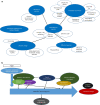Postmenopausal women's experiences of a resistance training intervention against vasomotor symptoms: a qualitative study
- PMID: 35907840
- PMCID: PMC9338607
- DOI: 10.1186/s12905-022-01900-0
Postmenopausal women's experiences of a resistance training intervention against vasomotor symptoms: a qualitative study
Abstract
Introduction: Resistance training may be an effective intervention to improve menopausal symptoms and increase women's quality of life. However, most postmenopausal women do not perform regular resistance training. The purpose of this study was to explore postmenopausal women's experiences of participation in a resistance-training intervention to find barriers and motivators for the training.
Methods: Fifteen postmenopausal women with low physical activity, who participated in a randomized controlled trial evaluating the effect of a resistance-training program on vasomotor symptoms and health-related outcomes, were consecutively recruited to this qualitative study. After completion of the 15-week resistance-training program, they took part in individual semi-structured interviews, followed by a telephone interview 1 year later. All interviews were transcribed verbatim and thematic analysis was used to analyse the data.
Results: The analysis generated three themes that were involved at different time points. These were: "Trigger-Hopes of symptom relief", "An evolving motivation as a driving force for change" and "Finding new triggers". Accountability, and continuous professional and emotional support, were factors that fueled the women's motivation to perform regular resistance training during the study. Resistance training improved general well-being and most women experienced improvement in vasomotor symptoms. The women's motivation changed from being driven by a wish to improve bothersome symptoms, into a wish to achieve feelings of well-being and enjoyment. The change was seen regardless of effects of the intervention on vasomotor symptoms.
Conclusion: This first qualitative evaluation of physical exercise as an intervention to treat vasomotor symptoms in postmenopausal women, found that the symptoms acted as a motivational trigger to initiate resistance training in low-active women. The motivation to exercise changed during the intervention from a wish to ameliorate symptoms into something the women did for enjoyment and well-being in general. This change in motivating factors may have contributed to a behavior change since all participants had increased their physical activity after 1 year regardless of effects on VMS. Trial registration The trial was preregistered at ClinicalTrials.gov; www.
Clinicaltrials: gov , ID: NCT01987778 , date of first registration: 19/11/2013.
Keywords: Exercise motivation; Hot flushes; Menopause; Qualitative research; Resistance training; Strength training; Vasomotor symptoms.
© 2022. The Author(s).
Conflict of interest statement
The authors declare that they have no competing interests.
Figures
Similar articles
-
A 2-year follow-up to a randomized controlled trial on resistance training in postmenopausal women: vasomotor symptoms, quality of life and cardiovascular risk markers.BMC Womens Health. 2024 Sep 13;24(1):511. doi: 10.1186/s12905-024-03351-1. BMC Womens Health. 2024. PMID: 39272114 Free PMC article. Clinical Trial.
-
Effects of resistance training on quality of life in postmenopausal women with vasomotor symptoms.Climacteric. 2022 Jun;25(3):264-270. doi: 10.1080/13697137.2021.1941849. Epub 2021 Jul 9. Climacteric. 2022. PMID: 34240669 Clinical Trial.
-
Women's views about physical activity as a treatment for vasomotor menopausal symptoms: a qualitative study.BMC Womens Health. 2020 Sep 14;20(1):203. doi: 10.1186/s12905-020-01063-w. BMC Womens Health. 2020. PMID: 32928185 Free PMC article. Clinical Trial.
-
An overview of menopause associated vasomotor symptoms and options available in its management.Niger J Med. 2013 Jan-Mar;22(1):7-14. Niger J Med. 2013. PMID: 23441513 Review.
-
Psychosocial and socioeconomic burden of vasomotor symptoms in menopause: a comprehensive review.Health Qual Life Outcomes. 2005 Aug 5;3:47. doi: 10.1186/1477-7525-3-47. Health Qual Life Outcomes. 2005. PMID: 16083502 Free PMC article. Review.
Cited by
-
Is concurrent training effective in the symptomatology of menopause, depression, sexual function, and the aging perspective of women during menopause? A randomised clinical trial.Prz Menopauzalny. 2025 Mar;24(1):33-44. doi: 10.5114/pm.2025.150142. Epub 2025 May 5. Prz Menopauzalny. 2025. PMID: 40718012 Free PMC article.
-
The AHAWOMEN project: study protocol of a multi-design research for exploring HAPA predictors of exercise in postmenopausal women.BMC Psychol. 2023 Jul 12;11(1):204. doi: 10.1186/s40359-023-01245-9. BMC Psychol. 2023. PMID: 37438855 Free PMC article.
-
Qualitative exploration of women's experiences of vasomotor symptoms to support the content validity of patient-reported outcomes.J Patient Rep Outcomes. 2025 Jul 1;9(1):79. doi: 10.1186/s41687-025-00914-0. J Patient Rep Outcomes. 2025. PMID: 40591096 Free PMC article.
References
-
- Sarri G, Pedder H, Dias S, Guo Y, Lumsden MA. Vasomotor symptoms resulting from natural menopause: a systematic review and network meta-analysis of treatment effects from the National Institute for Health and Care Excellence guideline on menopause. BJOG. 2017;124(10):1514–1523. doi: 10.1111/1471-0528.14619. - DOI - PubMed
Publication types
MeSH terms
Associated data
LinkOut - more resources
Full Text Sources
Medical



